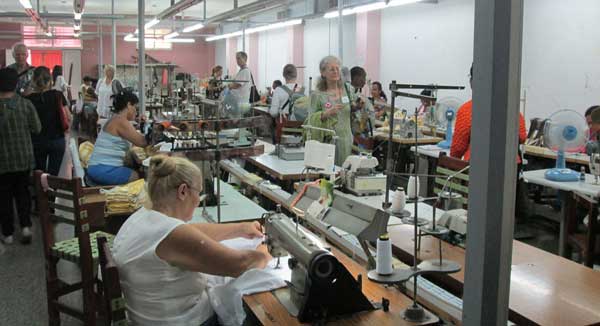 The Center for Global Justice organized a group of 32 persons who spent two weeks in Cuba June 19 to July 2, 2016, investigating the new cooperatives forming there. Most of us were members of co-ops, writers on co-ops or advocates of co-ops. Two thirds were from the US, the rest from Mexico, China, India, Germany, Switzerland and Canada.
The Center for Global Justice organized a group of 32 persons who spent two weeks in Cuba June 19 to July 2, 2016, investigating the new cooperatives forming there. Most of us were members of co-ops, writers on co-ops or advocates of co-ops. Two thirds were from the US, the rest from Mexico, China, India, Germany, Switzerland and Canada.
We visited a sewing co-op that makes guayabera shirts and dresses, a transportation co-op that operates a fleet of buses, several cooperative restaurants and even an accounting cooperative –seven in all. These are among hundreds of new urban co-ops that are opening up an important part of the emerging non-state sector of the economy in addition to the small private businesses that seem to be thriving. They offer a socialist alternative to state employment for workers who find that the cooperative form of management not only offers them democratic participation in running their collective business but also higher incomes, typically three times higher and as much as seven times higher than in state jobs.
Many of these co-ops were converted from state enterprises that now lease the building and other means of production from the state, but manage it as their own. The challenge the state conversions face is moving away from the familiar hierarchical relations in their workplace to genuinely democratic self-governance. For example, in the sewing factory we visited, the head of the cooperative refers to the fellow members as “my workers.” While she is no longer accountable to higher bureaucrats in the Ministry, one wonders how accountable her management is to the collective membership in spite of the monthly General Assembly meetings. The Institute of Philosophy, which hosted our trip, is conducting training here as well as in other places to educate workers about the social relations essential to a genuine co-op. It is easy to fall into habitual patterns. Building a cooperative is a process that takes some time.
This is easier to do when a group comes together voluntarily to form a new business from scratch, understanding from day one that the shared endeavor is theirs. An example of a self-initiated co-op is SCENIUS, the accounting firm we visited. In this unusual professional cooperative, the members refer to each other as “partners.” Similarly, more egalitarian attitudes can be seen in Biky’s restaurant. Although it was initiated by a small group who leased the building from the state, as they renovated the facility (using a loan from the bank), others joined them with the knowledge that they were becoming members of a self-governing enterprise. Now in their first year of operation, they have 120 members.
Our group found it exciting to get a glimpse into this new experiment in worker self-management that is unfolding. Particularly inspiring was a young group we met that wanted to start a bakery in their neighborhood. They had a clear understanding of what a cooperative should be and wanted to serve their community with such a business. We meet with them in a local restaurant that became a co-op after the formerly state restaurant went bankrupt. They now have a popular successful business. One can sense the appeal of such examples and expect they can spread rapidly once the way is opened for a fuller cooperatization in urban areas of Cuba. We saw the beginnings of the renovated socialism Cuba is developing. And it works.
